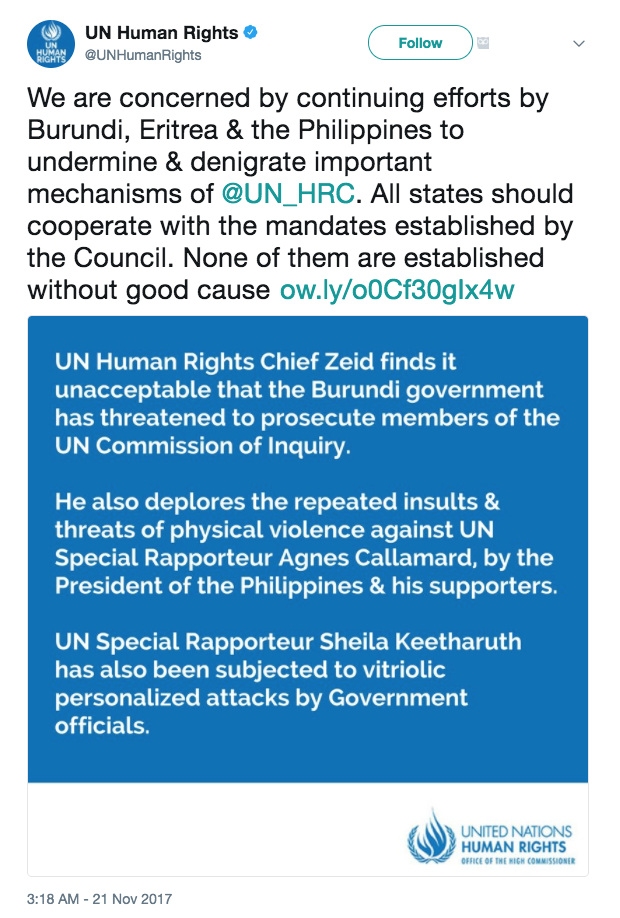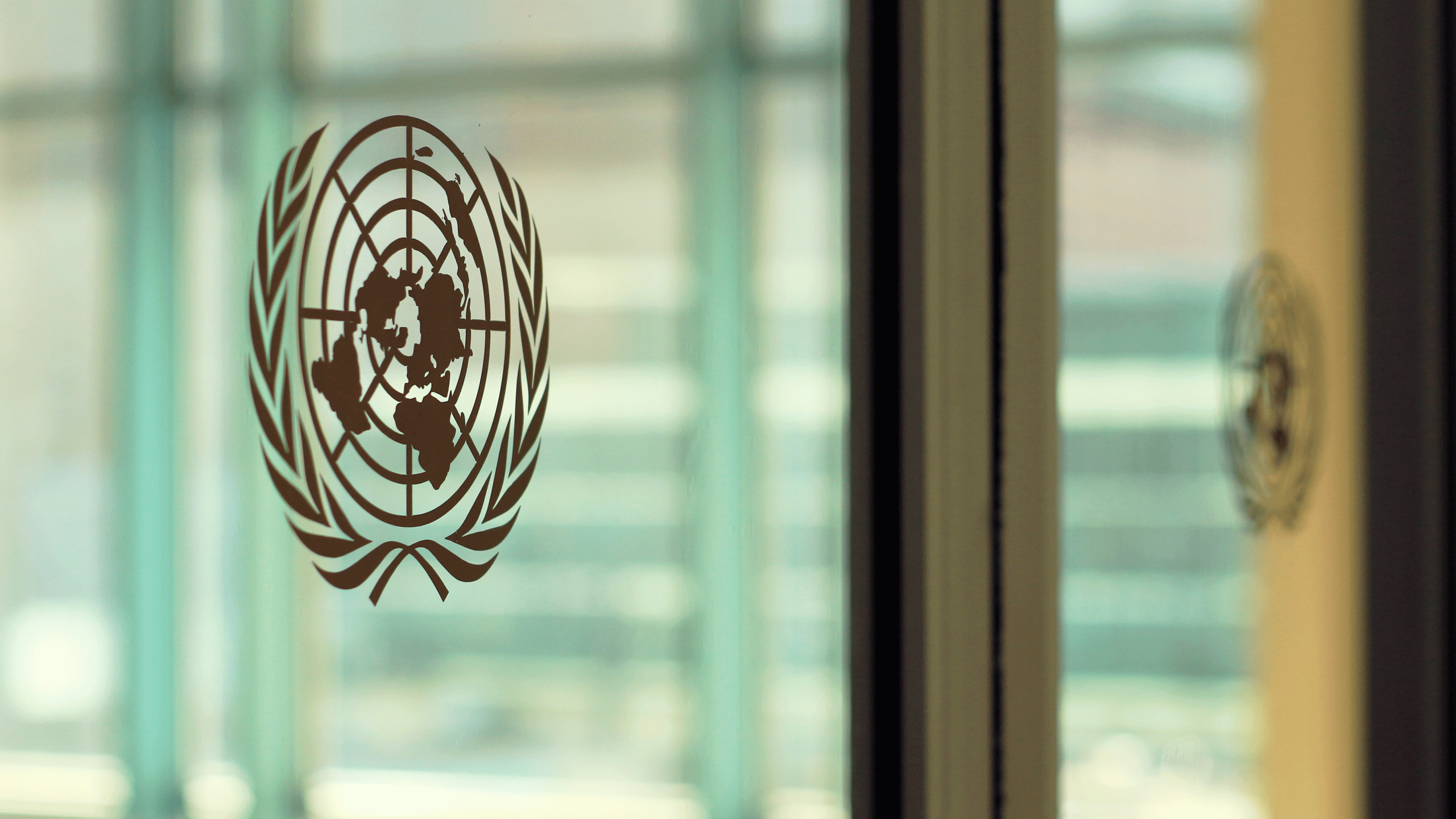For a more detailed version of the article click here.
Resolution outcomes
National human rights institutions (lead sponsor: Germany)
The Third Committee once again passed its biennial resolution on national human rights institutions (NHRIs) by consensus calling on ‘all relevant UN forums and meetings’ to provide for the engagement of ‘A’ status national human rights institutions.
Human rights defenders (lead sponsor: Norway)
Encouraged by the focus of this year’s resolution on the 20th Anniversary of the Declaration on Human Rights Defenders, the Third Committee adopted this year’s resolution on human rights defenders by consensus. For a detailed analysis see our web article here.
Safety of journalists and the issue of impunity (lead sponsor: Greece)
The Third Committee also adopted a most comprehensive and significant resolution on the safety of journalists and the issue of impunity. This is a major step considering that there has been a 90% impunity rate for the killing of journalists over the last decade. While the resolution passed by consensus with an increased number of co-sponsors, there was a disappointing lack of co-sponsorship from States from the Asia Pacific and African region.
Country resolutions
Several States that have taken so called principled objections to country-specific resolutions were prepared to put their concerns aside to support a resolution on Myanmar. After the EU discontinued its traditional resolution on Myanmar last year, this year saw the Organisation of Islamic Cooperation (OIC) introduce a resolution that was passed by 135 – 10 with 26 abstentions. The critical situation of the Rohingya people was the prompt for action.
The resolution on the autonomous Republic of Crimea and city of Sevastopol (lead sponsor: Ukraine) which passed by 71 -25, with 77 abstentions, showed little difference from the vote count a year ago.
The resolution on the Islamic Republic of Iran (lead sponsor: Canada) saw little change when compared to the text a year ago. Despite a slight change in the voting pattern, there is steady support within the Third Committee for this resolution: 83 – 30, with 68 abstentions.
In its resolution on the human rights situation in the Syrian Arab Republic, introduced by Saudi Arabia, the Third Committee foregrounded the role of Member States in creating ‘conditions for continued negotiations for a political solution to the Syrian conflict, under the auspices of the United Nations’. The Committee commended the work of the UN joint investigation mechanisms on its findings related to the use of chemical weapons.
The resolution on the Democratic People’s Republic of Korea (lead sponsor: Japan and Estonia (on behalf of the EU)) passed once again by consensus. In the resolution, States called on North Korea to implement recommendations made by the Commission of Inquiry on the country in 2014.
Resolutions related to terrorism
Several resolutions related to terrorism were adopted by the Third Committee including on ‘Protection of human rights and fundamental freedoms when countering terrorism’ (lead sponsors: Argentina, Japan, Liechtenstein and Mexico) and ‘Effects of Terrorism on the Enjoyment of Human Rights’ (lead sponsors: Egypt, Jordan, Morocco, Saudi Arabia).
Sexual and reproductive health
In resolutions concerning sexual and reproductive health, repeated attempts were made to alter agreed language. The question of parental guidance in regard to the provision of education related to sexual and reproductive health for adolescents and young people became an obstacle of several draft resolutions, including the resolutions on Girl Child, the Rights of the Child, and the Implementation of the Convention on the Rights of Persons with Disabilities (which also focused on the situation of girls and women with disabilities).

Burundi
The threats made against members of the Commission of Inquiry on Burundi during their interactive dialogue with the Third Committee were roundly criticised by the High Commissioner on Human Rights.
It is regrettable that no State, nor the Chair of the Third Committee or President of the General Assembly made any statement in defence of Commission members during the dialogue. Threats and attacks against UN independent experts – as described by the High Commissioner – show that States’ silence simply encourages perpetrators to feel emboldened. States must stand up for the independent experts they mandate to carry out essential human rights work.
Dynamics at Third Committee
At this session, several States employed the tactic of ‘disassociation’ to distance themselves from particular paragraphs in adopted texts. This occurred most frequently where lead sponsors introduced oral revisions to texts on the day of adoption without – apparently – consulting other co-sponsoring States.
‘The process of negotiations on human rights within multilateral spaces is weakened by both disassociation and last minute oral revisions. The incentive to seek common understanding and compromise is undermined if States consider that they can ultimately step away from elements they don’t agree with’, said ISHR’s Eleanor Openshaw.
Mexico emerged in this session as a voice in favour of common sense approaches. The country called out parallel conversations held in different UN bodies – including on issues related to social development and Agenda 2030 – and requested greater coherence and less duplication.
In the coming month, the UN General Assembly Plenary will consider resolutions adopted by all its Committees including those of the Third Committee.
To read about the resolutions in more details, click here.
Contact: Eleanor Openshaw, Head of New York Office of ISHR, [email protected], +1 929 426 7679
Photo: ISHR





